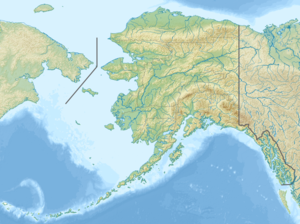| Togiak National Wildlife Refuge | |
|---|---|
IUCN category IV (habitat/species management area) | |
 Ahklun and Wood River Mountains, Togiak National Wildlife Refuge | |
Map of Alaska, United States | |
| Location | Alaska, United States |
| Nearest city | Dillingham, Alaska |
| Coordinates | 59°19′59″N 160°15′00″W / 59.333°N 160.250°W[1] |
| Area | 4,102,537 acres (16,602.38 km2) |
| Established | 1980 |
| Governing body | U.S. Fish and Wildlife Service |
| Website | Togiak NWR |

Togiak National Wildlife Refuge is in the Dillingham and Bethel Census Areas, Alaska. It is dominated by the Ahklun Mountains in the north and the cold waters of Bristol Bay to the south. The natural forces that have shaped this land range from the violent and powerful to the geologically patient. Earthquakes and volcanoes filled the former role, and their marks can still be found, but it was the gradual advance and retreat of glacial ice that carved many of the physical features of this refuge.
The refuge has a surface area of 4,102,537 acres (16,602.4 km2). It is the fourth-largest National Wildlife Refuge in the United States as well as the state of Alaska, which has all eleven of the largest NWRs. It is bordered in the southeast by Wood-Tikchik State Park, the largest state park in the United States.
The Togiak Wilderness occupies 2,274,066 acres (920,282 ha) in the northern half of the refuge. It protects pristine rivers, lakes, and steep-sloped mountains, including the rugged Ahklun Mountains and Wood River Range, which are located partly within the wilderness. Parts of the Kanektok, Goodnews, and Togiak drainages are also located within the boundaries of the Togiak Wilderness.[2]
